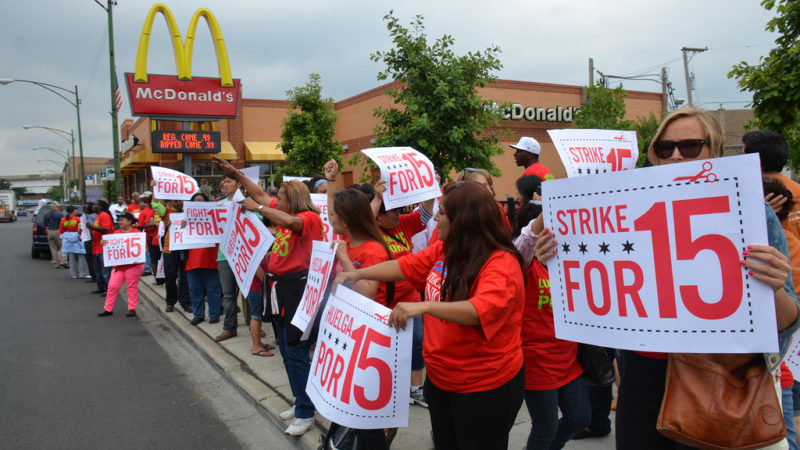December saw the first ‘full on’ blitz on US workers rights by Donald Trump - posing worrying questions about any UK/US trade deal.

Using the US National Labour Relations Board to attack gains made by working people and unions under the Obama administration, the Republican majority on the federal board has issued five decisions in a week – ones which overturned decisions made under the Obama administration.
By stacking the NLRB with Republican appointees, Trump has polished his union busting credentials – and it is expected to get worse as the Trump appointed general counsel, Peter B. Robb, (in effect Trump’s ‘prosecuting counsel’) now says he will attempt to reverse many more decisions taken under the Obama administration.
The one week blitz on employment rights and collective bargaining saw the Republican majority:
- Attack a 2016 decision requiring settlements to ‘provide a “full remedy” to aggrieved workers’
- Reverse a 2004 decision on workers’ rights to organise free from unlawful employer interference
- End a 2015 decision holding employers responsible for bargaining with workers if they have indirect control over those workers’ employment or have the ability to exercise control such as in franchise business’s including fast food outlets such as McDonald’s
- Reverse a 2016 decision safeguarding unionised workers’ rights to bargain over changes in employment terms
- Overturn a 2011 decision protecting the prerogative of a group of employees within a larger company to form a bargaining unit
All votes were a 3–2 decision, with Republicans in the majority and Democrats voting against.
The two Democratic board members accused the Republican NLRB members of breaking the law, as laws governing the federal agencies, such as the NLRB must act in a ‘logical and rational fashion’ and also are required consult with the public and bodies as such trade unions.
The NLRB is also required under US law to encourage “the practice and procedure of collective bargaining.” The Democratic members said the Republicans “failure to engage in the reasoned decision-making required of administrative agencies” breaks the law.
But it anticipated that the US legal system will not intervene – as it is a convention that that courts rarely interfere in NLRB decisions.
The scrapping of the decision on franchises and ‘indirect control’ – which said companies such as McDonald’s were jointly with franchise operators, employers of workers.
The NLRB had ruled that an employer can be forced to collectively bargain if it exercises indirect control over working conditions or if it has the un-exercised authority to exert direct control, allowing many low paid workers to join a union and to negotiate over terms of employment with the main company – not just direct management.
Another of these decisions is aimed at stopping the growth of ‘pop up’ or ‘micro unions’ as has been seen in the US fast food industry where workers band together quickly to unionise – often supported by local communities.
These have included fast food and car wash workers – and recently workers in the cosmetics department in the famous US Macy’s store who created their own union.
A 2011 NLRB ruling prevented businesses from busting these ‘guerrilla unions’ and eight federal appeals courts affirmed the ruling. But the new the NLRB scrapped it anyway – apparently because three board members “do not personally like it”.
Setting out a further blitz Peter B. Robb, issued a memo in December asking regional NLRB officers to flag disputes that involved cases handed down “over the last eight years that overruled precedent and involved one or more dissents.”
In 2018 Trump will appoint yet another Republican to the NLRB securing a Republican majority.
It is anticipated that that the Republicans will further attack the decision from the Obama era which allowed workers to secure unions rights by minimising the time employers can spend dissuading workers from unionising and stopping employers string out elections and subverting attempts by workers to organise.
Also anticipated is an attempt to overturn a decision permitting graduates students to organise into unions.
So much for Trump being the champion of US workers.
Equally, these decisions bode ill for any cobbled together trade deal Liam Fox’s possibly secures with Trump’s administration, and any hope of decent employment standards being part of it.
Tony Burke is Assistant General Secretary of Unite, and is a Contributing Editor for Left Foot Forward.




One Response to “Look to the US: How workers’ rights are being attacked under Trump”
Chester Draws
If such policies need to be in place, then they should be enacted by Congress.
When presidents short-cut the legislature to get what *they* want then there should be no surprises if their opponents are equally undemocratic. Obama was a shocker for enacting such decisions outside Congress, and Trump is merely following suit. But I don’t recall LFF getting outraged when Obama did it, because it’s adherence to democracy is paper thin.
Do it properly. Get proper laws enacted, then a President is bound by them. The problem is Obama couldn’t get such laws enacted, because Trump is actually doing what a large proportion of the electorate want. Moreover what he promised (again LFF struggle with democracy when it doesn’t go their way).
I think Trump is buffoon, and I don’t like US labour laws. But what Trump is doing is what he was elected saying he would do.
The Left need to run a better program. Worrying about real issues, like workers rights, rather than deciding rules on who can use what toilets, like Obama spent his time doing, would be a good start.